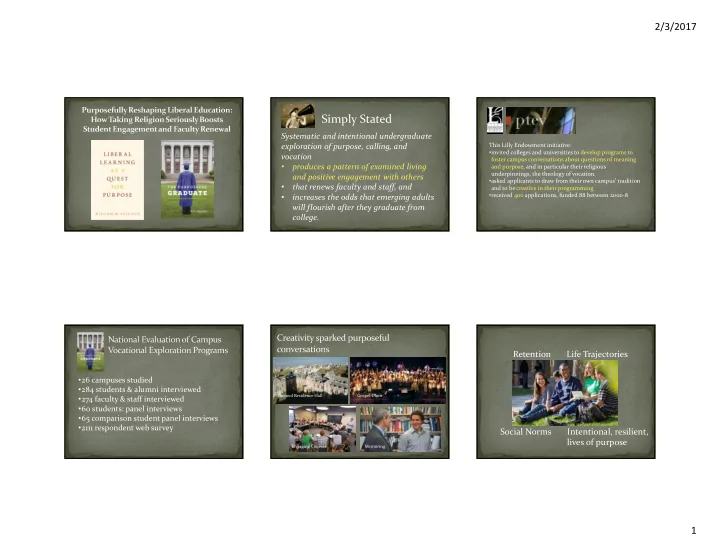

2/3/2017 Simply Stated Systematic and intentional undergraduate exploration of purpose, calling, and This Lilly Endowment initiative: • invited c0lleges and universities to develop programs to vocation foster campus conversations about questions of meaning • produces a pattern of examined living and purpose, and in particular their religious underpinnings, the theology of vocation. and positive engagement with others • asked applicants to draw from their own campus’ tradition • that renews faculty and staff, and and to be creative in their programming • received 400 applications, funded 88 between 2000-8 • increases the odds that emerging adults will flourish after they graduate from college. Retention Life Trajectories • 26 campuses studied • 284 students & alumni interviewed • 274 faculty & staff interviewed Themed Residence Hall Gospel Choir • 60 students: panel interviews • 65 comparison student panel interviews • 2111 respondent web survey Social Norms Intentional, resilient, lives of purpose Engaging Courses Mentoring 1
2/3/2017 84% confirmed that discussion, reflection, or Alumni comment: 81% reported that their campus’ purpose reading about purpose or calling had been “Although I had given some thought to questions exploration programming “encouraged me to see “helpful” or “very helpful” to them of vocation prior to [college], it was my [college] and serve the needs of others” 74% reported that they had a faculty or staff community that nurtured these inchoate 67% credited exploration programs with helping advisor with whom they had valuable thoughts and aspirations and gave me a place to “conversations about my vocation, calling, or them “identify [their] skills and talents” think broadly and deeply about where my purpose” 34% indicated that exploration programs led them abilities match up best with the world’s needs. By contrast, just 41% of graduating seniors answering “to alter [their] life plans” Playing a central role in this reflection was my HERI’s 2014 College Senior Survey responded that faculty participation in [a purpose exploration program] N=1,340 frequently provided them with emotional support and and my informal conversations with [staff encouragement, and 46% said one faculty member had taken “an interest in their development.” member name] and [two faculty names]” Overall, those who spent time exploring purpose or calling: 1) Voiced longer-term perspectives What happened with 2) Showed less concern for how their lives compared to their peers’ lives faculty and staff? 3) Sought out the advice of mentors and older adults 4) Demonstrated more resilience to setbacks, and maintained other-directed goals (i.e., “Holy Grit”) 5) Expressed more realistic expectations about life after college 6) Made decisions which moved them closer to their longer- Not sure if he can “do more with less” term goals (e.g., got married, enrolled in additional schooling, selected work intentionally) much longer … 7) Demonstrated more balance in their everyday lives (i.e., work/school, family, and goals for the future) 2
2/3/2017 To reach students, programs for the exploration of Cheryl Johnson, Associate Dean of Students: Rick Simpson, Professor of Communications purpose had to involve faculty & staff “It’s going to be incumbent upon college communities to figure out “The greatest thrill is working with students, helping Various approaches: how to relate to students in the richest, most meaningful kinds of them discover this [exploration] program, and then . . . retreats, ranging from 1 day to 2 weeks ways. What [the Journey Center] can do well and [must] continue seeing how the program affects their lives. I mean, for to do well is to give faculty and staff a vocabulary and resources to new employee orientation programs some of them, this is the catalyst that gets them foster those relationships as they relate to matters of life of the reading groups connected to the academics, that gives them a reason or mind, life of the spirit, life of the quest—however that shakes out. 10 week seminars purpose to be here, to discover themselves, [and to] start Because the students are going to keep coming, and I think the curriculum & program development grants worst thing that we could do is to throw up our hands and say that thinking about the future. That’s been extremely lecture series those questions don’t have a place at a college campus . . . [to] say, mini-grants rewarding.” ‘Well, we don’t speak that language.’ Our students want to talk that Faculty & staff said this exploration of purpose was as language, and I think it’s incumbent upon our community to try to relevant to them as it was to students understand it and keep the conversation going.” Discuss with seatmate: Where you would place yourself, your department or work unit, and your campus as a whole with respect to the following 86% of faculty participants said purpose exploration continuums: programs “have positively impacted my own work at Most colleges take a supply-side approach to student well- [this school].” 90% of staff participants said likewise being, prioritizing students who are a lot like their faculty 85% of faculty said these programs “deepened my and staff, mentoring 2-3% per campus (i.e., poster alums). Never Daily appreciation for the mission of [this school].” 93% of Frequency of Workplace Conversations But one-half of incoming college students report “find[ing] staff said likewise about Religious Belief, Value, or Practice my purpose in life” is a “very important” reason for attending 75% of faculty said their participation “helped me college! hone my own sense of ‘vocation,’ ‘calling,’ or ‘purpose’.” 84% of staff said likewise Never Daily Thus, there are many students who will eagerly participate in Frequency of Workplace Conversations N=595 creative, campus-based purpose exploration programming, about Vocation, Purpose, or Calling and apply what they learn to launch post-graduation lives of impact. 3
Recommend
More recommend